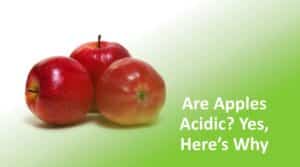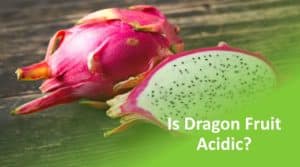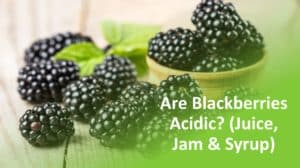Pineapples have a low pH level, which makes them acidic tropical fruits. If you are suffering from GERD or acid reflux, you should avoid consuming large amounts of these fruits, whether they’re fresh, juiced, or canned.
On the other hand, these fruits are a powerhouse of bromelain and fiber, the two superheroes that help digestion. In other words, if you include them in an alkaline diet, they might be more helpful than harmful.

pH Value of Pineapple
Pineapples score 3.2 — 4 on the pH scale, which makes them acidic.
The pH scale ranges from 0 to 14 and classifies foods as alkaline, neutral, and acidic. Anything below seven is considered acidic, while a score of 7 is considered neutral.
Examples of neutral foods and beverages are water, popcorn, and bananas. Everything that scores above 7 is alkaline, like most vegetables, beans, and nuts.
These tropical fruits have an acidic pH before digestion, so they can cause acid reflux. However, they become very alkaline once digested, with a pH of 9.
What Makes Pineapples Acidic?
Pineapple contains citric and malic acids. Citric acid is responsible for both the low pH and the pronounced tartness. Malic acid gives the fruit a sour flavor.
Does Pineapple Cause Acid Reflux and GERD?
Generally, no — but overeating can. They are acidic tropical fruits, so eating them in large amounts may cause acid reflux.
Acid reflux, or heartburn, is a burning sensation or irritation in your esophagus that can occur after eating acidic foods. It happens when the stomach acid moves back into the esophagus. The temporary relaxing of the lower esophageal sphincter is often responsible for acid reflux and heartburn.

Overeating, smoking, drinking alcohol or high-sugar beverages like Coca-cola, and eating highly acidic foods may all contribute to the relaxation of the LES. If heartburn becomes a regular occurrence, it will develop into more extreme reflux known as GERD.
Overeating these fruits may cause acid reflux and heartburn, but it can be healthy and alkalizing in moderate amounts.
Does Pineapple Aid in Digestion?
Pineapples are high in fiber and water content, the two elements that promote healthy digestion. Fiber is known to suck the excess acid content in the stomach, which means it can relieve you from your acid reflux symptoms if you have it — but make sure to eat pineapple in small amounts because it’s still acidic before digestion.
What’s more, it contains the digestion booster bromelain, a mixture of enzymes that have therapeutic health benefits. Bromelain is found in fresh pineapples and can break down proteins to help your digestive system.
The Acidity of Pineapple Juice
Canned pineapple juice has a pH of 3.30-3.60, making it more acidic than fresh pineapple.
Canned juice can contain a lot of sugar and additives, which slow digestion and increase stomach acid production. Moreover, alcohol is a typical heartburn trigger, so mixing pineapple juice with alcohol might worsen your symptoms.

If this fruit juice is your favorite drink, make it at home rather than buy canned juice from the store. If you blend fresh pineapple with mineral water, you can boost the pH level and make it easier on your stomach.
Canned Pineapple Acidity
The pH range of canned pineapple is 3.35 to 4.10. In addition to being acidic, it generally contains a lot of sugar.
Sugar increases stomach acid, leading it to reflux up your esophagus and cause heartburn. That’s the reason why it’s advised that you avoid canned fruits.
How Much Pineapple Can You Eat During Acid Reflux and Gerd?
Eating one cup of fruit from time to time can be fine if you are suffering from acid reflux. You can eat around a cup daily if you don’t suffer from acid reflux or GERD.
Eating too many of them not only may trigger heartburn, but the excess bromelain intake may cause heavy menstrual discharge, vomiting, diarrhea, and skin irritation.
Unripe pineapple should never be eaten since it’s toxic, extremely acidic, and may result in severe heartburn, diarrhea, and vomiting.
It’s recommended to eat at least 5 servings of fruit and vegetables daily to maintain neutral pH levels in our bodies. However, if you’re trying to treat heartburn, you should eat more vegetables than fruits because they are more alkaline than acidic.
Can Pineapple Contribute to a Healthy, Alkaline Diet?
Yes, if you combine it with the proper ingredients. An alkaline diet is about creating a healthy, balanced pH mix that is optimal for your body. You can combine neutral, moderately acidic, and alkaline fruits and vegetables to eat an alkaline diet.
Make an Alkaline Juice
Nothing beats an alkaline juice to start the day. Switch up your morning routine and make a juice with pineapple, carrots, ginger root, turmeric root, zucchini, and water instead of coffee. Pineapple, cucumber, spearmint, and water are also a good alkaline combo.
If you want to go a bit more tropical, mix pineapple, mango, ginger, water, and mint. You can prepare these juices the night before so that they are cold by the time you wake up.
Make an Alkaline Smoothie
Next time you want an afternoon snack, make a smoothie with pineapple, banana, and spinach. If you prefer a creamier smoothie, mix pineapple with kale or spinach leaves, ginger, wheatgrass, apple, and some coconut yogurt.
If you like your smoothies more watery, use the same ingredients but instead of yogurt, add coconut water. Your body will be grateful to you for all the health advantages an alkaline smoothie can provide.
Make an Alkaline Salad
A salad of fresh fruits and veggies gives you a boost of nutrition. But how do you incorporate this acidic fruit into a fruit salad? Easy, you mix it with acid-friendly fruits and herbs, like bananas, melon, cantaloupe, avocado, dates, and mint. Sprinkle a pinch of yogurt on top, and you are all done.
As for a veggie salad, try mixing these tropical fruits with lettuce, white beans, radish, and cucumber. Sprinkle some herb-infused oil on top, season with salt and pepper, and enjoy.
Conclusion
Pineapples have a pH value of 3.2 — 4, making them an acidic tropical fruit — but the presence of fiber and bromelain makes them good for digestion.
Big portions of this fruit most definitely trigger heartburn symptoms, so eating it from time to time and in moderate amounts is recommended.
If you suffer from acid reflux and GERD, avoid consuming canned fruits and fruit juice, as these products are high in sugars and additives.
If you are a fan of this sweet fruit, you can incorporate it into juices, smoothies, and salads with alkaline ingredients to balance its acidity.






